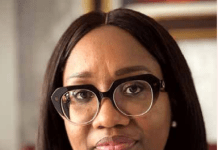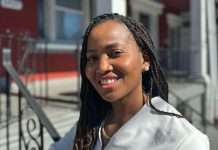To prevent disease outbreaks from taking a devastating toll on Nigerians, the government has to proactively prepare for health emergencies, as the current COVID-19 pandemic has exposed the unpreparedness of the nation’s health sector in managing disease outbreaks.
Pharm. (Dr) Ayo Fajembola, a retail pharmacist at Walgreens-boots, in Chicago, Illinois, USA, made this submission in an exclusive interview with Pharmanews, expressing her disappointment at the national response to COVID-19.
The University of Illinois graduate stressed that government needs to demonstrate its commitment to citizens’ welfare by putting appropriate policies and structures in place to safeguard their health, as the third wave of COVID-19 and other pandemics are a possibility in the country.
She also hinted on the forthcoming medical mission of ANPA and NAPPSA in Calabar, stating that the visiting team intends to see 300 patients each day for five days.

Below are the excerpts of the interview:
Briefly tell us about educational background, years of experience, and practice area.
I have a Doctor of Pharmacy degree from the University of Illinois in Chicago, and also a Bachelor of Science in Clinical Laboratory Science. I work as a retail pharmacist for Walgreens-boots in Chicago, Illinois. I have been with Walgreens for over five years, which has helped me to develop my skills as a pharmacist.
Aside from Pharmacy, I am a member of the Nigerian Association of Pharmacists and Pharmaceutical Scientists in the Americas (NAPPSA). I am a part of the young professionals committee and the membership committee, as well as being the medical mission’s coordinator.
With your experience in community pharmacy in the USA, what has the situation been for community pharmacies over there during this pandemic?
Initially during this pandemic, things were a little shaky. Just like the rest of the world, we weren’t sure about the future, and we didn’t know when it was going to be over. But one good thing about my company is that we already had protocols put in place. We were prepared in case of a pandemic and that is what I want Nigerian companies to emulate.
Basically, the company first of all made sure that the team members were sure, because we are in the public, seeing all kinds of people with different ailments. So, we needed to see that we had some COVID-19 protocols put in place. We ensured in our stores that people were six feet apart, people were sanitizing, and temperature and flexing glass was set up.
On our side of things, we had new protocols where we could deliver medications to people in their homes, especially the elderly patients. This is because they are prone and they have a weaker immune system; so they are considered high-risk. We had free delivery services. So each time people came, we made them realize that we do free delivery services at home.
We also encouraged people to do 90-day supply, as most insurance companies were covering for 90 days also, to prevent much exposure and crowd. On my side, I was in charge of logistics, ensuring that sick team members were being quarantined, and monitoring their recovery process.
Does Universal Health Coverage cater for the purchase of medications at the community pharmacy level?
Yes, most people have insurance and it covers about 80 per cent of their medications. Depending on the type of insurance you have, sometimes it covers 100 per cent, sometimes it covers generic over brand and so on. There is also Medicaid for low income earners, that can’t afford their basic medications, and for the elderlies. We also have Medicare, which is not very expensive and covers a lot, from aged people, to younger persons with disabilities, and so on.
Considering the management of the ongoing COVID-19 and pharmacy practice, how would you advise the Nigerian government?
“My message to the government is that they should be proactive and not reactive. They should put protocols in place, so that whenever a pandemic happens – because I don’t think COVID-19 is the last pandemic that will happen – appropriate response will be given to it.
Few years ago it was SARS. Then we had Ebola and others, all these require that things are put in the right perspective. Healthcare professionals need to be educated, hospitals need to be equipped and national healthcare system should be put in place that can protect citizens in case of any outbreak.
I was very disappointed when I found out that the COVID-19 vaccine we are getting in Nigeria was having 63 per cent effectiveness, compared to Pfizer and Moderna that were 94 and 91 per cent effective respectively. Besides, for Nigeria with over 200 million population, getting about 4 million doses cannot cover a major part of the population. So there is still a lot of work to be done.
Nigeria is the largest country in Africa by population. God forbid that another pandemic breaks out that is deadlier than COVID, what would be the nation’s response? Our government needs to show that they care for us, by being more proactive, invest in medical science and research, and prepare for medical emergencies. Top Nigerian scientists residing in Nigeria need infrastructures to assist their research efforts.
Preparations are ongoing for the NAPPSA’s medical mission in Nigeria. Share with us the locality and goal of the mission.
I’m really excited this year, and we are going to have our medical mission in Calabar. It was supposed to be held last year, but COVID-19 hindered us till now. This year is going to be very special because we are going to be having our first virtual medical mission, and as usual we collaborate with our sister organisation which is the Association of Nigerian Physicians in the Americas (ANPA). So we NAPPSA members are going to be joining them because they are our sisters.
Basically, the medical mission is to provide free healthcare to our people, especially those in the rural areas. This year, we are going to be hosted by Mrs Owanari Duke herself in Calabar, and we are going to collaborate with local pharmacists for the running around, while we in the diaspora are going to be available virtually for medical consultation with doctors. And from there, they come to the pharmacists for medication counselling.
It’s pretty exciting because we are going to be seeing 300 hundred patients per day for five days. We have surgeons on ground and they are going to be having about 120 surgical cases. We are still working on logistics for the programme. We have had our first two meetings and we still have more meetings to go. I have been part of it before and I’m excited to do many more.
Would you say there’s a possibility of a third wave of the pandemic in Nigeria?
Of course there is definitely a possibility of a third wave. Look at the UK, they are thinking about shutting down again. So, I think it’s going to take a while for COVID-19 to go away. It took a while to come and it will take away to go away.
There are countries that have been badly affected and we have countries that are just realising how deadly it is. Brazil have a surge. They didn’t take it seriously initially, but now they have a surge. You know the world is a global village now; people are travelling, and airlines are opening up. Since the world is getting smaller, the possibility of a third wave is strong.
I will use this opportunity to encourage everyone to get the vaccination. If you have not done so, try to protect yourself and take the necessary precautions to protect yourself and your family from the infection. We need to be proactive about it and do the right thing to prevent the spread.
The US is one of the countries that commenced COVID-19 vaccination earlier. Are there some lessons we can learn from them in terms of patients’ reaction to it?
The US was proactive as they pre-bought Pfizer and Moderna vaccines before the vaccines were ready. People are talking about it and I think President Joe Biden has met his goal of vaccinating a target he set for himself and he has even raised the bar now.
As pharmacists, it’s our job to educate people about vaccination against the widespread misconceptions about the vaccines. We are to tell people what to expect after taking it, as every vaccine has an affiliative reaction – maybe swollen arms or the person can develop a fever or stop breathing but that shouldn’t discourage people from getting it.
As a young pharmacist making impact in the US, how would you encourage your Nigerian colleagues?
I will commend them because despite our deficiencies and lack of structures, they are still thriving, and they are educating themselves. I have colleagues who are willing to update their knowledge always, despite their poor environment and meagre pay. When you visit some well-organised pharmacies in Lagos and you listen to pharmacists counselling patients, you will be impressed.
I also commend owners of pharmacies who are creating job opportunities for young pharmacists, because a lot of pharmacists graduate are finding it difficult to get jobs, even though they are licensed. So I want to appreciate those pharmacists who returned to Nigeria to create job opportunities.











